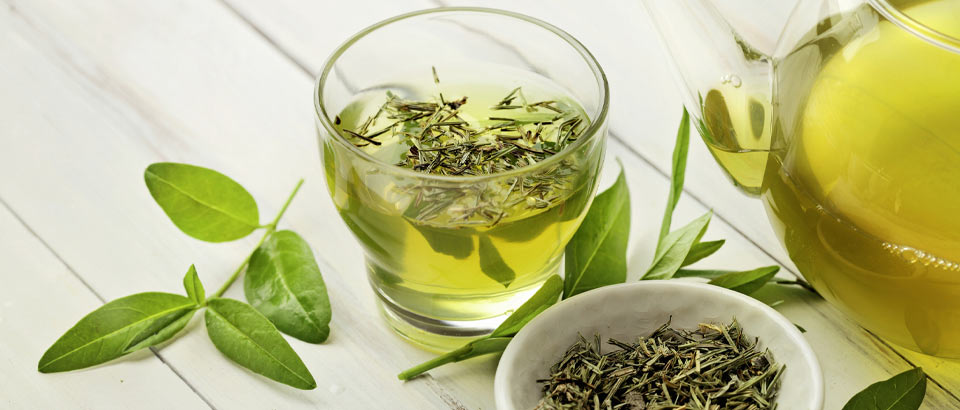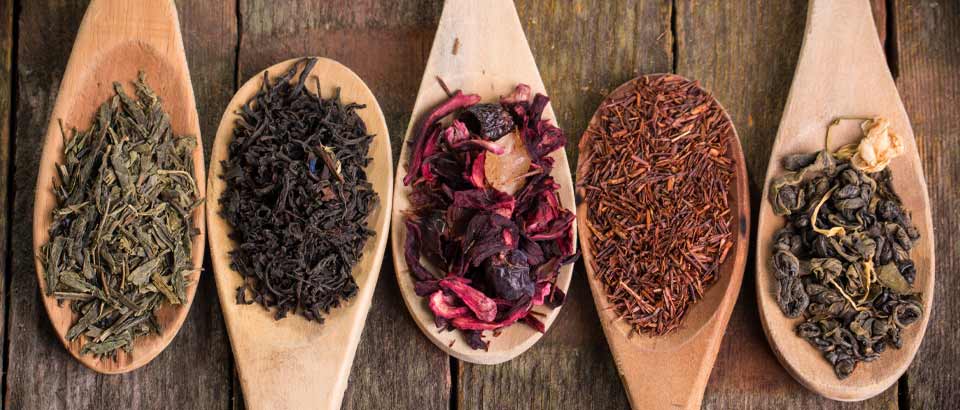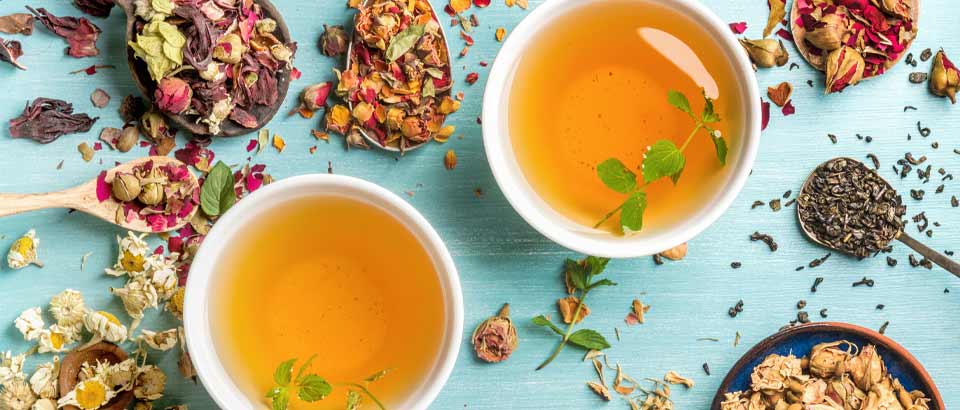January 17, 2023
Tea is one of the world’s oldest beverages and the most consumed drink in the world (after water of course), and there are some pretty good reasons for that..1
Not All Teas are Created Equal
The variety and different types of tea can seem confusing and overwhelming, but did you know that all tea comes from the same plant? Green tea, white tea, black tea and oolong tea are all considered true teas that are derived from the Camellia sinensis plant (also known as the tea plant).2 Each of these teas develops their own unique aromas and flavors through different harvesting and processing methods. One of the main methods that sets these four apart has to do with how much the leaves of the plant have been oxidized. Oxidizing is the process that involves leaving the tea leaves to dry and darken.
With all that said, this means that despite the name, herbal tea is not actually "tea". This is because it does not contain the leaves or leaf buds of the Camellia sinensis plant. Instead, these herbal blends are made using spices, flowers and leaves of a variety of other plants including fruits and herbs – which is how it gets its name.
If you’re wondering what’s the difference is between green and black tea (aside from the color), or what are the benefits you can get from different herbal teas, then this guide is for you.
Different Types of “True” Teas
1. Green Tea

Green Tea is often considered one of the healthiest tea options. To produce green tea, leaves from the Camellia sinensis plant are steamed or pan fried and dried. The tea leaves aren't exposed to air and so they don't oxidize, and the green hue remains. That also means the tea has more antioxidant properties that can help to boost brain and heart health.3
A brewed green tea is typically green, yellow or light brown in color, and its flavor profile can be described as light, fresh, and maybe slightly grassy.
There is also caffeine in green tea. A standard 8-ounce cup of green tea has about 28 milligrams of caffeine which is only about one-fifth the amount of caffeine in coffee (96 milligrams).4 This makes it a perfect drink to enjoy if you need help getting through a midday energy dip or just a little pick-me-up.
Common Types of Green Tea:
- Sencha: Usually savory, grassy, and slightly bitter and may carry a scent of melon or pine.
- Matcha: This is made by grinding the tea leaves into a fine powder. Matcha has some of the highest antioxidant levels of all green tea varieties.
2. White Tea
White tea is made from buds and young leaves of the Camellia sinensis plant. This tea is minimally processed similarly to green tea with comparable benefits. White tea benefits include catechins in the tea that may help lower blood pressure, improve circulation and lower the risk of heart disease. Antioxidants in white tea have also been shown to lower cholesterol levels.5
White tea is a subtle, fruity and sweeter tasting tea compared to the others. Many often ask does white tea have caffeine? Well, it does – but it is lower in caffeine than most, with only 15 milligrams per 8-ounce cup.
Common Types of White Tea:
- Silver Needle: Most delicate and fine white tea. The tea is made using only young leaves from the tea plant. It has a floral scent and sweet flavor.
- White Peony: Has a mixture of buds and leaves. It has a similar but stronger taste profile than the Silver Needle tea.
3. Black Tea

Black tea is the most popular type of tea (at least in the U.S.) and comes in many varieties.3 It is fully oxidized which turns the leaves from green to a dark brownish-black color, resulting in a much stronger taste than green tea. Some possible health benefits of black tea include alertness and energy, antioxidants properties to help boost brain and heart health as well as possible anti-cancer effects.
According to the National Cancer Institute, in a new study, researchers found that people who consumed two or more cups of tea per day had a 9 to 13 percent lower risk of death from any cause than people who did not drink tea. Higher tea consumption was also associated with a lower risk of death from cardiovascular disease, ischemic heart disease and stroke.6
Out of all the teas, black tea comes with the highest caffeine content. An 8-ounce serving of black tea has about 47 milligrams of caffeine (about half the amount in coffee), so it may be best to incorporate it into your morning routine to get your day started.4
Common Types of Black Tea:
- Earl Grey: Malty flavor with a hint of bergamot and/or citrus
- English Breakfast: Strong and bold taste with slightly sweet note
- Masala Chai tea: Blended with a variety of spices such as cardamom, cloves, and peppercorns
4. Oolong Tea
If you can’t decide between green and black tea, Oolong tea offers something in the middle. Oolong tea is somewhat oxidized – more than green tea's light oxidation but less than black tea's heavy oxidation.
An 8-ounce cup of brewed oolong tea contains 38 milligrams of caffeine. That's a bit more than a cup of green tea but less than both black tea and coffee.4
There seems to be less research about oolong tea than about green and black teas, but overall, the teas share similar health benefits.
Common Types of Oolong Tea:
- Ti Kuan Yin: Available in roasted and non-roasted versions. The taste is mild and lightly sweet.
- Da Hong Pao: There's a smokey flavor to this tea, due to its leaves being baked over wood ashes.
Herbal Teas
Herbal teas are made from caffeine-free ingredients, so they are a great option for someone who wants a cozy beverage before bed that won’t keep them up all night. As mentioned above, herbal tea can contain a blend of herbs, spices, fruits or other plants which makes the list of options very extensive. Some of the most common ones include:
1. Chamomile Tea
Chamomile tea comes from the edible flowers of the Matricaria chamomilla plant and is known for its calming effect before bedtime. More than just a relaxing drink before bed, research studies suggest several possible benefits of the tea include a lower risk of death from heart disease and immune system support.7
2. Ginger Tea
Reach for a cup of ginger tea if you’re feeling nausea or have aches and chills. While it won’t shorten the time of your sickness, ginger is believed to help counteract the nausea that occurs with many ailments. If you don’t have the prepacked tea bags at home, you can always make your own ginger tea. Simply grate a ginger root and let it steep in hot water for a couple of minutes and enjoy!
3. Peppermint Tea
Peppermint tea is a refreshing herbal tea with some great potential health benefits. There is more research around the oils in peppermint leaves than the tea itself. The peppermint oil, which peppermint leaves contain has a relaxation effect on the gastrointestinal system and can help relieve an upset stomach or indigestion.8 Peppermint leaves (which is what makes up the tea) also contain an essential oil called, menthol. This oil acts as a decongestant and can help open your airways and alleviate clogged sinuses.9 This makes it a great tea option if you’re experiencing sinus pain and a stuffy nose.
If you have a health condition or you’re pregnant, consult with a physician to determine whether drinking herbal teas are safe for you.
MedExpress Pro Tip: If you want to sweeten your tea, honey maybe the healthiest choice. Not only is honey a natural sweetener but it contains a mix of amino acids, vitamins, minerals, iron, zinc and antioxidants. Combining tea with honey can even soothe a cough or sore throat. Be mindful of how much honey you're using to keep added sugars in check. The American Heart Association recommends that adults limit added sugars to between six to nine teaspoons a day.10
No matter the season, tea can be the perfect beverage option since it can be served hot or over ice. But, its benefits go far beyond being just another drink. Drinking tea every day can have a positive effect on your overall health. The healthiest tea is said to be one that you actually drink consistently. Find teas that you enjoy and don't be afraid to experiment with flavors and mix it up to find the best tea to help you achieve your specific health goals and tastes.
References
1 Food and Agriculture Organization of the United Nations: Tea. Accessed November 4, 2022.
2 NCCIH: Tea. Last updated November 1, 2022. Accessed November 4, 2022.
3 Harvard.edu. The Nutrition Source: Tea. Last updated January 27, 2022. Accessed November 4, 2022.
4 Mayo Clinic: Caffeine Content for Coffee, Tea, soda and More. Last updated April 26, 2022. Accessed November 4, 2022.
5 National Library of Medicine: Catechin Intake. Last Accessed November 4, 2022.
6 National Cancer Institute: Health Benefits of Black Tea. Last updated August 29, 2022. Accessed November 4, 2022.
7 National Library of Medicine: Chamomile: A herbal medicine of the past with bright future. Accessed November 4, 2022.
8 National Library of Medicine: A review of the bioactivity and potential health benefits of peppermint tea. Accessed November 4, 2022.
9 National Library of Medicine: The Wonderful Activities of the Genus Mentha. Accessed November 4, 2022
10 American Heart Association: Added Sugars. Last updated Nov 2, 2021. Accessed November 4, 2022.


